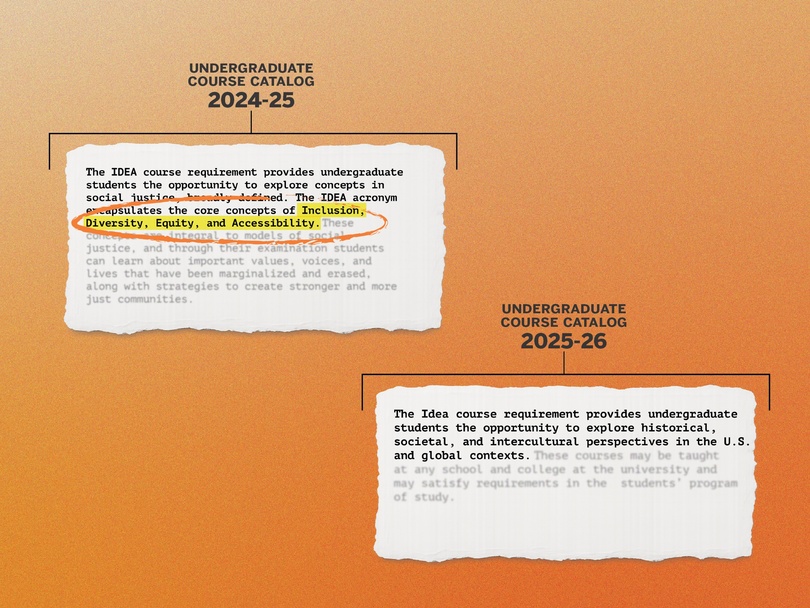SU removed DEIA language from its IDEA course description over summer

SU removed blatant mentions of words tied to diversity, equity, inclusion and accessibility from its formerly titled “IDEA” curriculum description and shared competencies. The changes will have “no impact on students’ course obligations, learning experience or outcomes,” a university spokesperson said. Design by Ilana Zahavy | Presentation Director
Get the latest Syracuse news delivered right to your inbox.
Subscribe to our newsletter here.
Syracuse University removed over half of the words in its Inclusion, Diversity, Equity and Accessibility course description and altered the language of two of its six shared competencies over the summer, removing blatant mentions of diversity, equity, inclusion and accessibility-related words.
Nearly all SU undergraduate students are required to take an “IDEA course,” meant to give students an opportunity to “explore concepts in social justice,” according to SU’s 2024-25 course catalog.
Now, the classes are referred to as “Idea courses,” removing the meaning from the previous acronym. The changes will have “no impact on students’ course obligations, learning experience or outcomes,” a university spokesperson said in a Tuesday statement to The Daily Orange.
“The IDEA acronym encapsulates the core concepts of Inclusion, Diversity, Equity, and Accessibility,” an excerpt of the old version reads. “These concepts are integral to models of social justice, and through their examination students can learn about important values, voices, and lives that have been marginalized and erased, along with strategies to create stronger and more just communities.”
The university cut 165 words from its description, leaving no mention of DEIA or related words like “social justice,” “marginalized,” “oppression” and “equitable.”
The course catalog’s new language says the Idea course gives students the opportunity to explore “historical, societal, and intercultural perspectives” in national and international contexts.
The full new version reads: “The Idea course requirement provides undergraduate students the opportunity to explore historical, societal, and intercultural perspectives in the U.S. and global contexts. These courses may be taught at any school and college at the university and may satisfy requirements in the students’ program of study.”
As President Donald Trump’s administration continues to target higher education institutions for their DEIA practices, SU professors said they’re worried because faculty were not involved in the changes.
“We’re constantly being told that no courses are being abolished, and that people are free to teach what they want to teach,” said Margaret Susan Thompson, co-chair of the University Senate Academic Affairs committee. “And to a great extent, that’s true. But if I were an untenured faculty member right now, I would be very nervous about what I was teaching.”
The university also changed the language in the university’s shared competencies, which encompass six different institutional learning goals that “enhance” undergraduate education, according to the course catalog.
“These were hammered out over the course of years by various committees that included administrators and faculty working constructively and constructively together to produce language that defined the shared competencies and the Idea requirement,” said a faculty member who requested to remain anonymous. “Now we come back in the fall to discover that some anonymous administrator made changes to both of these things without any faculty input whatsoever.”
The first competency, previously called Ethics, Integrity, and Commitment to Diversity and Inclusion, is now Ethics and Integrity.
The language of the fourth competency’s description, Civic and Global Responsibility, was reworded, taking out mention of “inclusive civic and cross-cultural learning.”
The previous description also included an emphasis on “public, global, and historical issues,” which was changed to “self-reflection, civil discourse, reciprocity, and participating as engaged citizens in local and global contexts.”
The other five — Critical and Creative Thinking, Scientific Inquiry and Research Skills, Civic and Global Responsibility, Communication Skills and Information Literacy and Technological Agility — appear unchanged.
“These competencies are part of the university’s obligations under Middle States accreditation and reflect ongoing alignment with accreditation standards,” the university spokesperson wrote. “The University has a duty to ensure compliance with our accreditor body’s expectations.”
Every eight years, the university is required to undergo a review process to maintain its accreditation from the Middle States Commission of Higher Education. Accredited institutions must prove their self-appraisal, institutional accountability and innovations and improvements through campus dialogue.
SU is amid its reaccreditation process, and is expected to be examined by the commission in spring 2027.
The shared competencies are supposed to be voted on and approved by the Senate before being made public, Thompson said.
“The shared competencies were approved by the Senate and were approved by various faculty groups and so forth, and then we come back after the summer and discover that they’ve been changed,” Thompson said. “And that’s a concern.”
Thomas Barkley, co-chair of USen’s Curriculum and Instruction committee, said because the Idea changes did not pertain to the curriculum itself, the Provost’s office — which oversees the course catalog — was not required to go through the senate to make language changes.
“The only thing that was changed was some of the language that is at the top of the page that essentially describes what (Idea) courses are, but that page is under the auspices of the office, and so they are allowed to make changes to that without consultation,” Barkley said. “That’s their prerogative.”
Barkley said faculty concerns are being discussed within his respective committee, though no plans have been finalized.
In March, the Trump administration sought to wipe the federal government of DEIA-related language and flagged hundreds of words to avoid, The New York Times reported. Many of the words previously used appeared on that list.
At the first USen meeting of the fall 2025 semester, Provost and Vice Chancellor Lois Agnew confirmed that the changes had been made after senators asked questions about the change, with some alleging it was made without senate or faculty approval.
“The reason I’m really wanting us to move forward with this process now is that we have the opportunity to work together and really think about those questions of how we can come up with informed decisions that aren’t driven by panic,” Agnew said in the meeting.
Of the 152 courses listed under the Idea requirement, 113 are under the College of Arts and Sciences and Maxwell School of Citizenship and Public Affairs, which are conjoined in the catalog.
“The university is trying to argue, and I think they’re right on one level, that they’re not trying to eliminate courses, but they’re trying to make the requirements and the guidelines at SU correspond to the new set of rules coming from Washington,” Thompson said.
Admission into 20 majors in Arts and Sciences is currently paused as the university undergoes an academic portfolio review of its programs, degrees and majors.
Steven Diaz, a professor and former member of the curriculum committee, said it’s clear the university is trying to “act more quickly” in response to the federal government to stay under the radar.
“That’s always a sort of issue to what extent the administration needs to come to the Senate for proposal of things,” Diaz said. “According to the official rules, we control curriculum, but everything else is really just advisory to the administration. But where do you draw the line? Everything we do gets related to curriculum somehow.”
The university closed its Office of Diversity and Inclusion in June, replacing it with the Office of People and Culture within the Office of Human Resources. The closure drew criticism from the campus community.
Thompson said some of the former ODI’s functions related to curriculum, but HR has “no jurisdiction” over course content.
“It’s understandable that the Syracuse University administration would try to keep a very low profile, and engage in what the administration probably considers minor examples of anticipatory obedience by scrubbing DEI language from different offices and units,” the anonymous faculty member said. “But of course that’s going to affect students, especially students of color.”
In January 2025, the American Association of University Professors condemned universities for “acquiescing” to the federal government’s attacks on higher education and complying before any pressure to do so.
“While university administrators and faculty members may be compelled to comply with legislation and court orders, even where these run counter to professional and constitutional principles, they remain free to register their disagreement,” the statement reads. “And under no circumstances should an institution go further than the law demands.”
As SU undergoes a major period of transition, with the search for its next chancellor underway and an ongoing review of major programs, Thompson said she’s unsure what the university will look like in the coming years.
“We’re in a time of uncertainty. We have a new chancellor coming in. In a year after that, we will have a new provost,” Thompson said. “What are they going to do about these things?”
CORRECTION: A previous version of this article’s headline included the word “quietly.” This word choice was inaccurate, as the work was done over the summer by full-time employees. The Daily Orange regrets this error.





